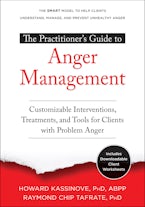By Howard Kassinove, PhD, ABPP, and Raymond Chip Tafrate, PhD
Part three of a four-part series on anger
The secret to helping clients develop better reactions to unpleasant, unwanted, and even risky life situations is to develop safe, in-office practice opportunities for exposure to real-life triggers. Having clients overcome anxiety, shyness, and other problems often involves them facing the very situations that trigger their strong emotions. When it comes to anger, the approach is similar. One potential key to success is to provide practice opportunities for clients to counter destructive thoughts, increase adaptive thinking, and reduce automatic-like behavioral reactions.
We routinely expose clients to some of the nasty verbalizations they experience in their daily lives. We have found this technique to be among the most efficient for developing and practicing new, adaptive reactions. Sometimes such practice is preceded by training in calming techniques such as relaxation and deep breathing. When carried out well, exposure often leads to laughter, and is memorable for clients.
Consider the following case example with Jaden, a thirty-two-year-old married man on probation. He has had seven previous sessions, and the overall therapeutic relationship is positive.
Practitioner: Today we are going to do a little acting. I’m going to be a voice that is disrespecting you. I’m going to say the kinds of things you’ve said really trigger your anger. I want you to be a thought inside your head that deals with it. Use the thoughts we have discussed that are likely to make you less reactive, even calm. We will start slow. Ready?
Jaden: Okay.
Practitioner: You ain’t shit in the streets. Everyone talks about you behind your back.
Jaden: Leave it alone. Don’t do it. Just let it go.
Practitioner: Good job. That was great. Now, do you think we can kick it up a notch?
Jaden: Yeah.
Practitioner: You’re a punk bitch. I can kick your ass any time.
Jaden: He’s trying to get to me. He wants me to fight. But, I’m on probation and I don’t want to go back to jail. Don’t react. It is only unpleasant and doesn’t mean anything. Take a deep breath, walk away.
Practitioner: Good. You handled it again.
Jaden: [Laughing] . . . Why did you call me a punk bitch?
Practitioner: Because your main risk factor is your anger and tendency to become aggressive. You’re too emotionally reactive. You’re not out there selling drugs or guns. My concern is that there are a lot of nasty people in this world. If someone says something demeaning or condescending to you, it would be good if we develop your ability to deal with the belief ‘I can’t let anybody disrespect me.’ If that belief comes to you when things go wrong, you might react with anger or aggression, and that will cause negative consequences. I don’t want that for you.
Jaden: Okay, I understand. That sounds good.
Practitioner: And you are a punk bitch, right?
Jaden and Practitioner: [Both laugh]
We understand this technique may seem odd or unusual to some readers. Consider, however, the following questions. What is at stake for Jaden? Loss of freedom? Physical injury? Loss of a job? Death? When appropriate, and the therapeutic relationship is strong, why not practice real-world skills with clients that might actually save their relationships and lives, and reduce negative, anger-related outcomes?
Consider exposure practice to help clients replace their automatic-like anger reactions with new and better kinds of thinking and behaving that are likely to produce more positive results. Once automatic-like responses are better managed, you can introduce additional interventions to address social and interpersonal problems.
Catching up on the series? Read parts one, two, or four now.
Howard Kassinove, PhD, ABPP, is a board-certified clinical psychologist, former chairperson of the psychology department at Hofstra University, and past director of their PhD program in clinical and school psychology. Kassinove is a fellow of the American Psychological Association, the American Psychological Society, the Albert Ellis Institute, and the Behavior Therapy and Research Society. Editor of Anger Disorders, he has published more than sixty papers, and has lectured widely in the United States, Europe, and Asia.
Raymond Chip Tafrate, PhD, is a clinical psychologist, and professor in the criminology and criminal justice department at Central Connecticut State University. He is a fellow and supervisor at the Albert Ellis Institute in New York City, NY; and a member of the Motivational Interviewing Network of Trainers. He frequently consults with criminal justice agencies and programs regarding difficult-to-change problems such as anger dysregulation and criminal behavior. He has coauthored numerous books, and has presented his research throughout North America, Europe, Asia, and Australia. He is coauthor, with Howard Kassinove, of the popular self-help classic, Anger Management for Everyone.



 Part 2: What to Do When a Client Is Participating in Self-Judgment?
Part 2: What to Do When a Client Is Participating in Self-Judgment?